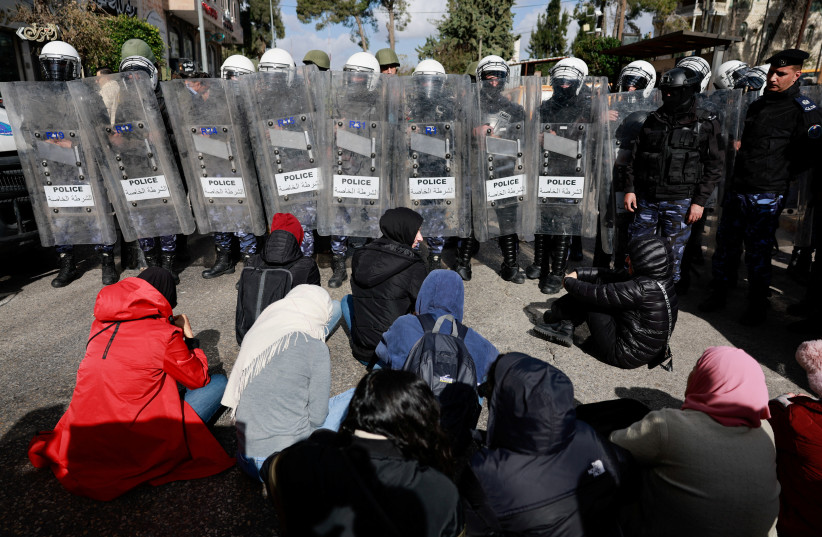Dozens of angry protesters demonstrated against the arrival of US Secretary of State Antony Blinken in Ramallah on Wednesday by burning posters of him and of Israeli Prime Minister Benjamin Netanyahu.
Blinken was in Ramallah to meet with Palestinian Authority President Mahmoud Abbas after meeting with Netanyahu and other officials in Israel the previous day.
Protesters called on Abbas not to meet with Blinken and for the PA to end all communication with Washington. They described the United States as "the snake's head" and said that rather than demanding a cease-fire in the Gaza Strip, the US has been enabling Israel to continue the war.
Tensions in West Bank at boiling point
Many analysts say the West Bank is on the verge of explosion, with the war in the Gaza Strip only escalating tensions. Last year was one of the deadliest years in recent history in the West Bank, with more than 350 Palestinians killed by Israeli fire over the year, according to the PA's health ministry.
"We are here to tell Mr. Blinken that he’s not welcome in Ramallah. He’s part of the war, they are part of the invasion, they are part of the killing of thousands of innocent people. And we don’t accept that he’s playing the role of peacemaker," Ruba Masrouji, an activist with the National Coalition, told The Media Line.

As Blinken met with Abbas in the presidential compound, the crowd tried to access the road leading to it, but police and security forces prevented them from doing so.
Blinken discussed with Abbas efforts to “minimize civilian harm” in Gaza and increase the delivery of aid to Gazans, the US State Department said in a statement. The previous day in Israel, Blinken made the same points.
The two men also discussed postwar plans for Gaza, including steps towards the establishment of a Palestinian state.
Abbas told Blinken that the PA would not allow the displacement of Palestinians, whether from Gaza or from the West Bank.
He also told Blinken that the Palestinians would not accept what he described as Israeli plans to keep the Gaza Strip separate from the West Bank, according to Wafa, the Palestinian Authority’s official news agency.
“The Gaza Strip is part and parcel of the state of Palestine,” the agency quoted him as saying.
In Israel on Tuesday, Blinken called for the overhaul of the PA and said it had a "responsibility to reform itself and improve its governance issues."
He also said that the only way to reach a lasting solution that would ensure Israel’s security would be by pursuing a path to a Palestinian state.
Before traveling to Israel and the PA, Blinken held a series of meetings with other leaders around the region. His meetings have focused on seeking a longer-term approach to the decades-old Israel-Palestinian conflict, as well as ending the war in Gaza. After he met with Arab allies, he said they wanted integration with Israel—also a long-term Israeli aim—but only if that included a "practical pathway" to a Palestinian state.
"I think there are actually real opportunities there," Blinken told Israeli Foreign Minister Israel Katz on Tuesday.
"But we have to get through this very challenging moment and ensure that October 7 can never happen again and work to build a much different and much better future."
Blinken urged Netanyahu to ensure that the Israeli military avoids inflicting further harm on civilians in Gaza.
Prof. Eytan Gilboa, an expert on the US at Bar-Ilan University and senior fellow at the Jerusalem Institute for Strategy and Security, told The Media Line that the US and Israel remain close.
"The two sides are in agreement on the purpose of the war, which is the removal of Hamas from Gaza, and there's also an agreement that Gaza would not be ruled either by Hamas or Israel," he said.
"There's also some agreement about what is known as Phase 3 of the war. Phase 1 was the air force [aerial bombardment], Phase 2 high-intensity [ground offensive], and the third phase is low intensity."
Iranian involvement in conflict
Gilboa said that a full-fledged war might prompt Iran to push its proxies to retaliate.
"The US is concerned that a regional war would also mean attacks on American bases and facilities and soldiers in the entire region," he said.
But he suggested that a full regional war was becoming less of a concern, as last week the USS Gerald Ford aircraft carrier returned to its base in the US after five months in the Middle East.
"If the US is that concerned about war expansion, why did they take back the carrier USS Gerald Ford?" Gilboa said.
